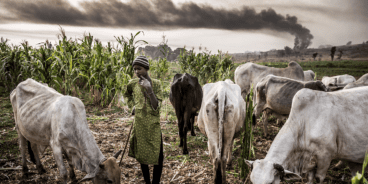Atrocity Alert No. 119: Myanmar (Burma), Syria and World Humanitarian Day
Atrocity Alert is a weekly publication by the Global Centre for the Responsibility to Protect highlighting situations where populations are at risk of, or are enduring, mass atrocity crimes.
1st anniversary of Myanmar’s genocide against the Rohingya
This week marks one year since security forces in Myanmar (Burma) began so-called “clearance operations” against the Rohingya population in Rakhine State. There is overwhelming evidence that during the operations launched on 25 August 2017 Myanmar’s security forces committed widespread and systematic attacks against Rohingya civilians, and that these crimes may amount to genocide under international law. More than 700,000 Rohingya were forced to flee to Bangladesh due to the violence.
Despite years of early warning regarding systematic persecution and institutionalized discrimination against the Rohingya, the international community utterly failed to adequately respond to atrocities committed in Rakhine State. In particular, the UN Security Council (UNSC) has still not adopted a single resolution regarding the Rohingya crisis. The UNSC will, however, hold an open briefing on Myanmar on 28 August.
One year after the launch of the so-called “clearance operations,” not one of the senior military officers responsible for atrocities in Rakhine State has been held accountable in a court of law. Instead, local authorities continue to conceal mass graves and bulldoze the remains of Rohingya villages, preparing them for “redevelopment.” Since August 2017 Myanmar’s government has also systematically blocked access to northern Rakhine State for international investigators, media and humanitarian organizations.
On 15 August the “Independent Commission of Enquiry” established by Myanmar’s government held its first meeting at the office of State Counsellor Aung San Suu Kyi. Despite its name, this body represents yet another attempt by Myanmar to avoid a transparent and internationally credible accountability process.
The UNSC should urgently refer the situation in Myanmar to the International Criminal Court for investigation. All UN member states should also impose an arms embargo on Myanmar and targeted sanctions on all senior officers with command responsibility for atrocities committed in Rakhine State, including armed forces Commander-in-Chief Min Aung Hlaing.
Syrian government prepares for possible final offensive against Idlib
In recent weeks violence in Syria’s Idlib governorate has escalated as the government prepares for a potential final military offensive against the region. Between 10-12 August at least 116 civilians were killed in Idlib and neighboring Aleppo governorate due to airstrikes, shelling and the explosion of a weapons depot.
Idlib and adjoining portions of Aleppo and Hama governorates constitute the last remaining opposition stronghold within Syria. Following past government offensives in Aleppo, Homs and the southwest of the country, hundreds of thousands of opposition supporters were evacuated to Idlib. As a result, there are over 1.5 million internally displaced people now living within the governorate.
In 2016 the Syrian government’s offensive on eastern Aleppo led to the deaths of hundreds of civilians and the displacement of over 116,000 people. Earlier this year shelling and airstrikes resulted in the deaths of at least 1,700 civilians across eastern Ghouta and the displacement of 150,000 people, many of whom were relocated to Idlib. A similar offensive on densely populated Idlib would be catastrophic for the civilian population.
Idlib governorate is home to almost 3 million people and is controlled by dozens of armed groups, including several responsible for grave human rights abuses. Jan Egeland, Special Advisor to the UN Special Envoy for Syria, recently stressed that although “there could be thousands of armed men that are designated terrorists” within the governorate, “there are hundreds of times more women and children and other civilians in this area.”
For years the international community has watched as civilian populations across Syria have been besieged, bombed, starved into submission, and forced to flee their homes. Despite past failures, the UNSC must uphold its responsibility to protect civilians in Idlib, and work to prevent a final military offensive on the governorate.
World Humanitarian Day takes place amidst growing attacks on civilians and aid workers
Sunday, 19 August, marked World Humanitarian Day, which pays tribute to humanitarian workers who risk their lives while assisting the most vulnerable populations in the world. The theme of this year’s World Humanitarian Day was #NotATarget, reaffirming that deliberately attacking civilians is a violation of International Humanitarian Law.
The #NotATarget campaign also draws attention to the increasing number of attacks on humanitarian workers in conflict zones around the world. On 13 August the Aid Worker Security Database (AWSD) published its annual report. According to AWSD, in 2017 a total of 313 humanitarian workers were victims of major attacks, with most incidents taking place in South Sudan, Afghanistan, Syria and Central African Republic. All of these countries are also currently included within the Global Centre’s list of “Populations at Risk” of mass atrocity crimes.
According to the AWSD, 139 humanitarian workers were killed, 102 wounded and 71 kidnapped in 2017, marking a 30% rise in fatalities as compared to 2016. Due to increased insecurity, many humanitarian organizations have been forced to suspend operations. The AWSD report also notes that 91% of aid workers attacked during 2017 were local employees.
Vital humanitarian aid can mean the difference between survival and death for millions of people around the world. In conflict zones deliberate attacks on humanitarian workers constitute war crimes and are often linked to attempts to perpetrate other mass atrocity crimes against vulnerable populations. With over 68 million people currently displaced by war, persecution and atrocities, the vital work of humanitarian organizations has never been more important.
Read Next
Related Publications

Atrocity Alert No. 445: Sudan, Syria and Eritrea

Atrocity Alert No. 444: Nigeria, Haiti and South Sudan
